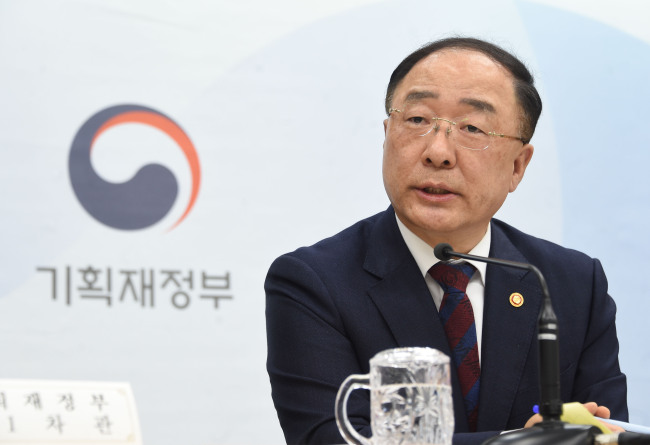S. Korea draws up W6.7tr budget bill to curb fine dust, boost economy
Govt expects extra spending to further reduce dust emissions by 7,000 tons, boost GDP growth by 0.1% this year
By Bae HyunjungPublished : April 24, 2019 - 09:58
The South Korean government has drawn up an extra budget of 6.7 trillion won ($5.9 billion) in an effort to alleviate the fine dust problem and respond to economic downside risks, the country’s top fiscal policymaker said Wednesday.
The budget, though it fell short of the 9 trillion won recommended by the International Monetary Fund, came as a response to the government’s struggles to achieve the targeted growth range of 2.6-2.7 percent amid a slowing economy and export challenges.
The budget, though it fell short of the 9 trillion won recommended by the International Monetary Fund, came as a response to the government’s struggles to achieve the targeted growth range of 2.6-2.7 percent amid a slowing economy and export challenges.

“The supplementary budget seeks to respond to two urgent tasks -- people’s safety in relation to fine dust and a pre-emptive response to economic situations,” said Deputy Prime Minister and Finance Minister Hong Nam-ki during a Cabinet meeting at Seoul Government Complex.
Upon approval by the Cabinet, the budget bill is to be submitted to the National Assembly on Thursday, according to the Ministry of Economy and Finance.
To minimize the fiscal burden, the government will use surplus accounts and funds as resources while issuing 3.6 trillion won in national bonds to make up for the shortage.
Korea’s debt-to-GDP ratio will stand at 39.5 percent after the extra budget implementation, up only 0.1 percentage point from the current 39.4 percent, the ministry said.
In a separate move earlier this month, the government delivered a total of 10.5 trillion won to local autonomous bodies as special subsidies.
“Should local governments set up their own extra budget based on this (subsidy), we expect greater synergy for the people’s safety and the nation’s economy,” the minister said.
According to Greenpeace International, Korea ranks second in ultrafine dust concentration among member states of the Organization of Economic Cooperation and Development.
“The recent Gangwon wild fire has shown that fine dust is no longer just an environmental issue, but a threat to people’s lives and the country’s economy,” Hong said.
The eastern coast of Gangwon Province was hit by a wild fire earlier this month, which consumed about 1,757 hectares of land, including 1,250 units of houses, warehouses, farms and other facilities.
Allocating 2.2 trillion won to fine dust problems, the government vowed to take all possible measures on key emission sources of dust, starting with industries and transport.
“Some 38 percent of the (fine dust) budget will be spent on supporting the replacement of outdated industrial facilities and monitoring the emission of air pollutants,” the ministry said in a release.
“Also, 28 percent will be spent on improving the transport sector, such as increasing subsidies for low pollutant cars and scrapping aged diesel cars.”
Responding to wild fire concerns, the government said it will spend 94 billion won on reinforcing the country’s firefighting workforce and related infrastructure.
The fiscal chief also underlined expanding downside risks weighing down Asia’s fourth-largest economy.
“Major international organizations (are) set to revise down their global economy outlook for this year, reflecting the slower-than-expected economy,” he said.
Earlier this month, the IMF reduced its outlook for 2019 to 3.3 percent, down from its earlier forecast of 3.5 percent. The OECD similarly set the yearly outlook at 3.3 percent in March, down 0.2 percentage point from its previous figure.
Furthermore, Seoul’s trade-reliant economy has seen a steady decrease in exports, which declined for the fourth consecutive month in April.
“(The government) shall expand investment for small and medium-sized firms, increasing export finance through policy finance institutions by 264 billion won,” Hong said.
“We expect this measure to lead to an expansion effect of around 2.9 trillion won on exports.”
Korea Trade Insurance Corp. accounts for 170 billion won, while the Export-Import Bank of Korea, the Korea Credit Guarantee Fund, and Korea Technology Finance Corp. are to undertake the remaining amount, according to the ministry.
By Bae Hyun-jung (tellme@heraldcorp.com)




![[Herald Interview] 'Amid aging population, Korea to invite more young professionals from overseas'](http://res.heraldm.com/phpwas/restmb_idxmake.php?idx=644&simg=/content/image/2024/04/24/20240424050844_0.jpg&u=20240424200058)











![[KH Explains] Korean shipbuilding stocks rally: Real growth or bubble?](http://res.heraldm.com/phpwas/restmb_idxmake.php?idx=652&simg=/content/image/2024/04/25/20240425050656_0.jpg&u=)

